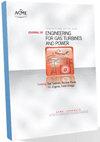Effect of Fuel Reactivity and Operating Conditions On Flame Anchoring in the Premixing Zone of a Swirl Stabilized Gas Turbine Combustor
IF 2.1
4区 工程技术
Q3 ENGINEERING, MECHANICAL
Journal of Engineering for Gas Turbines and Power-transactions of The Asme
Pub Date : 2023-10-07
DOI:10.1115/1.4063688
引用次数: 0
Abstract
Abstract Flashback with subsequent flame anchoring (FA) is an inherent risk of lean premixed gas turbine combustors operated with highly reactive fuel. The present study has been performed to characterize flame stabilization in the premixing zone of a lean premixed swirl stabilized burner and to identify critical combustion characteristics. An optically accessible burner was used for experimental investigations under atmospheric pressure and elevated preheat temperatures. The air mass flow rate, global equivalence ratio and preheat temperature were systematically varied to identify critical operating parameters. Hydrogen-natural gas mixtures with hydrogen mass fractions from 15 to 100 % were studied to evaluate the impact of fuel reactivity. The air-fuel mixture was ignited with a focused single laser pulse to trigger FA in the premixing zone during steady operation. High speed imaging with OH*-chemiluminescence were applied to observe flame characteristics and evaluate flame anchoring propensity. Flame anchoring limits (FAL) are reported in terms of the minimum global equivalence ratio at which the flame was blown out of the premixing zone within a critical time period. A comparison of characteristic time scales at FAL shows that the main impact during flame anchoring is given by the fuel reactivity and to some extent by preheat temperature. A Damköhler criterion is derived from the FAL that allows prediction of FA propensity based on operating conditions and 1-D reacting simulations.燃料反应性和工况对旋流稳定燃气轮机燃烧室预混区火焰锚定的影响
闪回伴随火焰锚定(FA)是使用高活性燃料的贫预混燃气轮机燃烧室的固有风险。本研究对稀薄预混涡流稳定燃烧器预混区的火焰稳定性进行了表征,并确定了关键的燃烧特性。在大气压和预热温度升高的条件下,采用光学可及燃烧器进行实验研究。系统地改变空气质量流量、整体等效比和预热温度,以确定关键运行参数。研究了氢质量分数为15%至100%的氢-天然气混合物,以评估燃料反应性的影响。在稳定运行时,用聚焦的单激光脉冲点燃空气-燃料混合物,在预混区触发FA。采用氢氧*化学发光高速成像技术观察火焰特性,评价火焰锚定倾向。火焰锚定极限(FAL)是根据在临界时间内火焰被吹出预混区的最小全局等效比来报道的。FAL特征时间尺度的比较表明,燃料反应性和预热温度在一定程度上影响了火焰锚定过程。从FAL推导出Damköhler标准,允许基于操作条件和1-D反应模拟预测FA倾向。
本文章由计算机程序翻译,如有差异,请以英文原文为准。
求助全文
约1分钟内获得全文
求助全文
来源期刊
CiteScore
3.80
自引率
20.00%
发文量
292
审稿时长
2.0 months
期刊介绍:
The ASME Journal of Engineering for Gas Turbines and Power publishes archival-quality papers in the areas of gas and steam turbine technology, nuclear engineering, internal combustion engines, and fossil power generation. It covers a broad spectrum of practical topics of interest to industry. Subject areas covered include: thermodynamics; fluid mechanics; heat transfer; and modeling; propulsion and power generation components and systems; combustion, fuels, and emissions; nuclear reactor systems and components; thermal hydraulics; heat exchangers; nuclear fuel technology and waste management; I. C. engines for marine, rail, and power generation; steam and hydro power generation; advanced cycles for fossil energy generation; pollution control and environmental effects.

 求助内容:
求助内容: 应助结果提醒方式:
应助结果提醒方式:


